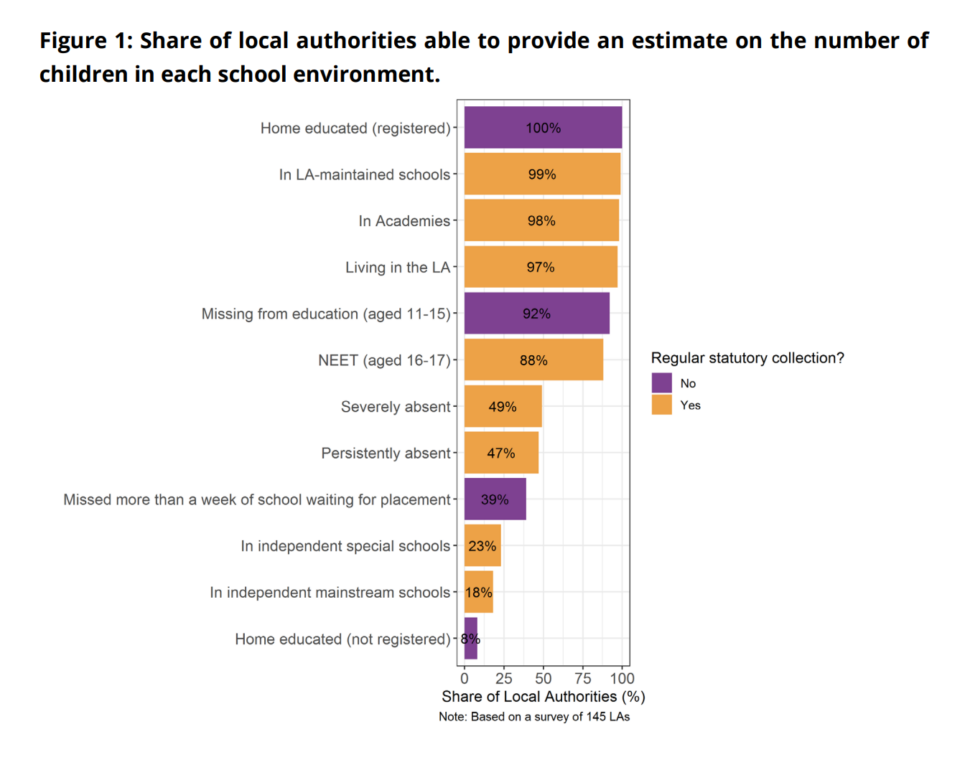The children’s commissioner has called for wide-ranging reforms to the way data on pupils is collected and shared, after finding most councils don’t know how many pupils are missing out on education in their areas.
Dame Rachel de Souza pointed to “significant weaknesses” in data held by local authorities, after most were unable to say how many children missed school while waiting for a placement or how many are educated at home or in private schools.
But councils have warned the “safety net” provided by local government and schools is “stretched to capacity”, with the pandemic having “worsened” problems caused by a lack of resources and powers.
In a report published today, de Souza called for “rationalisation” of school management information systems to make them compatible with each other, and said ministers should consider making independent schools complete a termly census.
A “unique identifier” for pupils or better use of existing NHS numbers should also be considered to enable councils to better track pupils, and the government should encourage better data-sharing between academy trusts and local authorities through new guidance.
de Souza launched an inquiry in January amid concerns about tens of thousands of children believed to be missing out on education.
She obtained data from 96 per cent of local authorities, but found that councils “do not have an accurate figure of how many children there are in England – let alone the number of children not receiving education”.
Many LAs rely on “time-lagged population estimates” to tell them how many children there are, but “migration and other factors mean this information is often inaccurate”.
‘Hundreds of children we know nothing about’
Although most councils provided data for the number of children officially classed as “missing education”, the report warned this was likely to only cover a “subset of the true number”.
This is because there are “hundreds of children that have never interacted with the education system that we know nothing about”.
On average, local authorities reported that 0.3 per cent of pupils were missing education, but some councils reported rates as high as 4.1 per cent, while others had none.
But 8 per cent of councils did not report any data at all, despite there being a statutory requirement to collect it.
Less than two in five councils (39 per cent) were able to say how many children missed more than a week of education while waiting for a school placement, while only 18 per cent could say how many children attended independent schools.

All councils were able to say how many pupils were registered as home-educated, but registration is not currently a legal requirement, and just 8 per cent of councils had figures for those learning at home who had not been registered.
A spokesperson for the Local Government Association warned the “safety net that schools and councils provide to ensure that children do not miss out on their entitlement to education is stretched to capacity”.
This had been “exacerbated by a lack of resources and powers available to councils to fulfil their statutory duties – which worsened as a result of the pandemic”, they said.
1.8 million pupils persistently absent
Ministers have expressed fears about persistent absence, which has been exacerbated by the Covid pandemic.
Based on data from around half of councils, de Souza’s report estimated that almost 1.8 million pupils (22 per cent) missed more than 10 per cent of sessions in the autumn term last year, while 124,000 (1.5 per cent) per cent missed over half.
The findings mirror those published by Education Datalab last year, which showed that over 20 per cent of primary pupils and over 30 per cent of secondary pupils were persistent absentees.
In 2018-19, before the pandemic, 10.3 per cent of pupils were persistently absent.
“While the majority of children are attending every day, there are tens of thousands of children who are persistently or severely absent or missing from education altogether,” de Souza warned.
The government has already committed to a register of children educated at home, but the Department for Education said last month that setting it up hinged on ministers securing extra funding.
The DfE also recently launched a trial of a live attendance tracker, which collects data from school management information systems. So far more than 12,000 schools have signed up.
Ministers have also launched a network of attendance advisers to help councils and academy trusts tackle absences, but announced in November that only five had been appointed.
It comes after the government scrapped the £600-million-a-year education services grant (ESG) in 2017, which councils used to fund services such as attendance officers.
A DfE spokesperson said they were “determined to drive up attendance and address barriers to attendance”.
The recommendations
- Rationalise management information systems to make them compatible with each other and make it easier for councils to collect data
- Consider requiring independent and unregistered schools to complete a termly census, as state schools have to do
- Address inconsistencies in the way schools use attendance codes and develop a “deeper” understanding of how they are applied
- Consider using a “unique identifier” for pupils, or use existing identifiers like an NHS number to enable LAs to better track children
- Provide further guidance to encourage better data-sharing between academy trusts and local authorities
- Provide more information for LAs on what constitutes best practice in data sharing, and clarify roles and responsibilities in the system
- Make parents responsible for registering their children with the LA if they are not in school
- Make schools full statutory members of local safeguarding partnerships, giving them a “seat at the table” alongside the LA, police and NHS
- Make partnerships agree a common protocol for working with schools to counter poor attendance and unnecessary exclusion
- Every department and public body should make attendance and safeguarding their priority
















The local council does not have the money to find these pupils. In my opinion as a home educator they don’t need to find them. In my experience as worker in a “hard to reach religious community” the council has no desire to find these children. Most of the schools are already registered with the education department and are following existing rules. I think this is also true of home educating families. I think it is a red herring to distract from the reasons so many people choose to not send their children to school. Religion in state school (wgich denies access to minority pupils in catchment areas) poor funding, lack of special education support and the stress of having to force children into a system that prides attendance over mental health.
What seems to be missing from these recommendations for LAs is who, who is supposed to do this, there are only small teams or no teams across different authorities? Many of these missing children have SEMH needs and schools use reduce timetabling as a long term strategy in addressing this need, its not right but some have no other option other than permanent exclusion. I hope this is addressed in the SEND review.
The key thing here is that they want to be able to link the child’s school attendance to an NHS record and vaccination status and pile it all in to the Vaccine passport. It is part of the slow introduction of China’s social credit system. Every bit of data can be unmasked. They pull on our heart strings about apparently children missing an education while the real effect is sinister on privacy. Stop trying to track our children, their data is valuable and you are stealing it. If it’s so valuable to someone, pay for it.
Surely the recommendations ought not to be about improving the numbers and attendance – but instead addressing the issues which are leading to young people not going to school? Where is the analysis on the root causes of non-attendance? And where is the guidance on approaches to address each of those root causes? Numbers simply tell you there is a problem. They are of little use beyond that, if no investment in analysing the problem and addressing its causes are taken. I found reading the list of recommendations rather irritating – more effort and staffing focusing on the wrong thing.